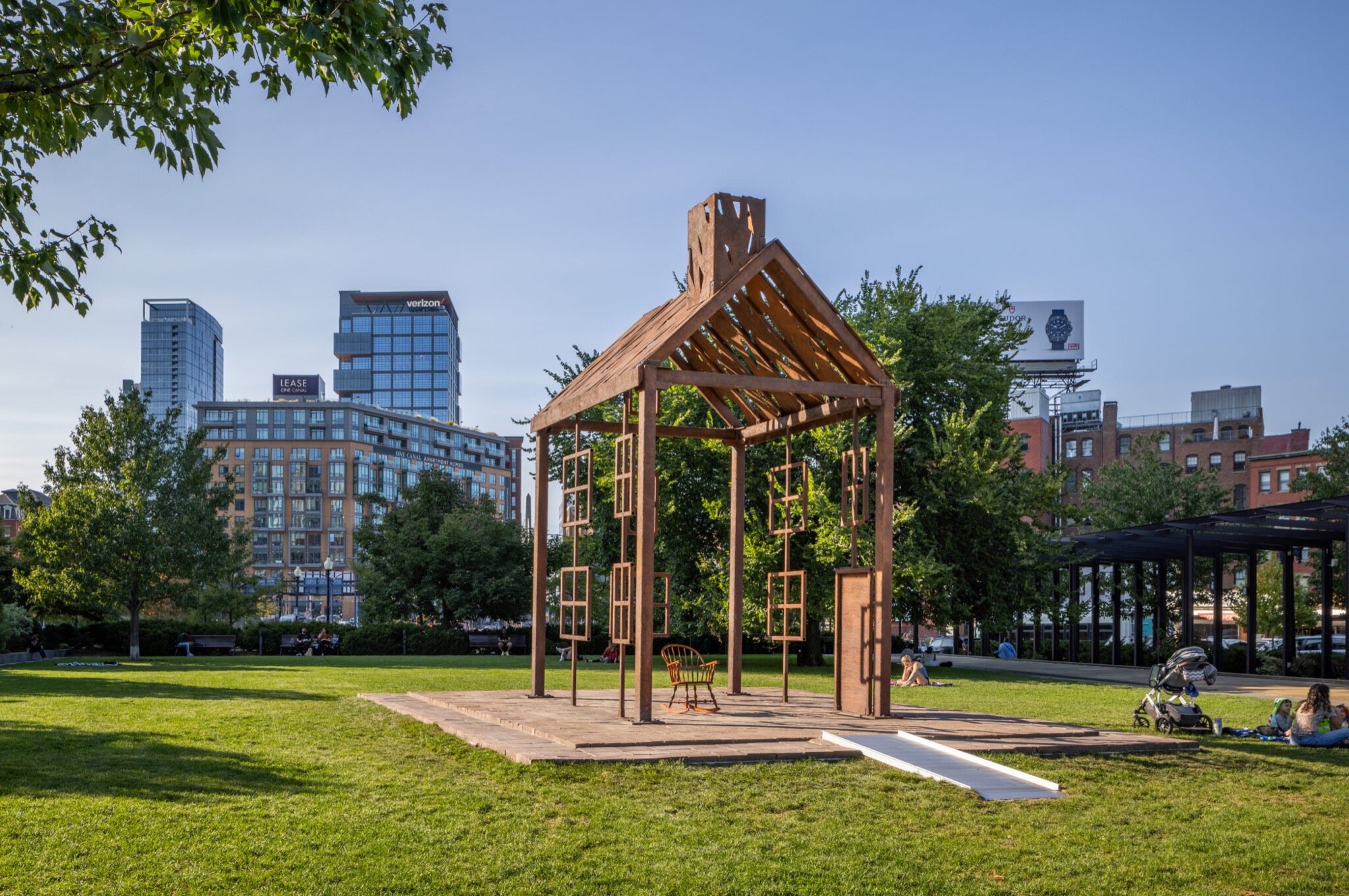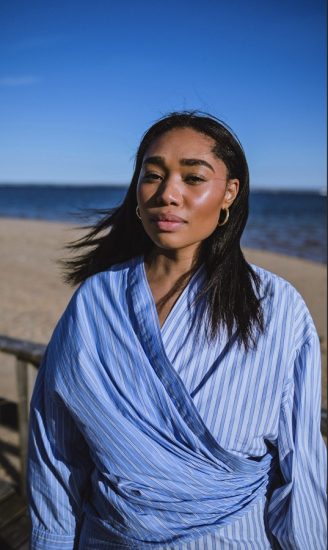Holding Space Together: Fellow LaRissa Rogers Opens New Installation in Boston

A view of Going to Ground by LaRissa Rogers on the Rose Kennedy Greenway in Boston’s North End. (Photo by Chris Rucinski)
“Holding Space Together.” Featured in The Provincetown Independent. Story by Chet Domitz. Published September 10, 2025.
LaRissa Rogers, a 2023-2024 visual arts fellow at the Fine Arts Work Center in Provincetown, has made a two-thirds-scale replica of Atkins’s house, installed on the Rose Kennedy Greenway in Boston through the end of October.
Zipporah Potter Atkins was the first Black woman to own a home in Boston. She was born in 1645 to enslaved parents and purchased her house in 1670. Rogers’s work honors Atkins and her legacy while drawing attention to troubling aspects of African-American history, including the transatlantic slave trade and the more recent displacement of homeowners to build the John F. Fitzgerald Expressway.
Rogers speaks of “spaces of possibility” regarding Atkins’s house. That a 17th-century Black woman in America might own a home seems implausible. But at the time of Atkins’s birth, the law in the Massachusetts Bay Colony declared that children born to slaves were free.
The design, materials, and site of Rogers’s public sculpture, titled Going to Ground, echo with poetic and historical significance. The details of Atkins’s story are recorded in the sculpture’s foundation. Its dimensions, 25 by 29 feet, correspond to Atkins’s age when she purchased the house (25), and the number of years she owned it (29). Constructed of modular steel, the sculpture is an open structure in the shape of a modest two-story house. Based on renderings from historical records of Atkins’s home, it features rectangular four-pane windows, a solid door, and a chimney.
Rogers went to the ground herself to create the foundation of her sculpture. She used oyster shells collected during her time at the Fine Arts Work Center to create a limestone mixture called tabby, a precursor to concrete.
“I wanted to incorporate that because there’s such a tie to tabby in the enslaved communities, especially on the East Coast,” says Rogers. She was also thinking about a relationship to land not tied to the commodification of labor. “There’s a rich history of freedmen’s towns and Black beaches,” she says. “I wanted to bring in these places of play and joy.”
The foundation is also made of earthen blocks that include soil contributed by members of the Boston community. Rogers hosted an “open call for soil,” asking people to submit soil samples from personally meaningful places, “a communal gesture in open-hearted labor and Black placemaking.” She received more than 100 submissions.

Photo by Steve Osemwenkhae
LaRissa Rogers is a multidisciplinary artist whose work investigates how personal and shared memory and history impact the perpetual evolution of cultural identity formation and placemaking. Research and material become the entry point of broader social-political interrogations, often asking the question, who and what survives?
Rogers was named to the Forbes’ 2024 “30 under 30” list in the Art and Style category. She has exhibited at Documenta 15 (Germany), Weserburg Museum (Germany), Lilley Museum (NV), the Wattis Institute of Contemporary Art (CA), the California Museum of Photography (CA), the Virginia Museum of Contemporary Art (VA), Los Angeles Contemporary Exhibitions (CA), California State University, Fullerton, The Massachusetts College of Liberal Arts (MA), Torrence Art Musuem (CA), and the Fuller Craft Museum (MA).
She received the Visual Arts fellowship at the Virginia Museum of Fine Arts (2022) and the Fine Arts Work Center Fellowship (2023-2024). Rogers also held residencies at the Bemis Center of Contemporary Art (2022), the Skowhegan School of Painting and Sculpture (2024), and MASS MoCA (2025). She is a recipient of Anonymous Was a Woman (2025) and has been featured in The New York Times, Harper’s Bazaar Japan, The Washington Post, The Los Angeles Times, ARTnews, ARTSY, New American Paintings, Boston Art Review, and The Boston Globe.

